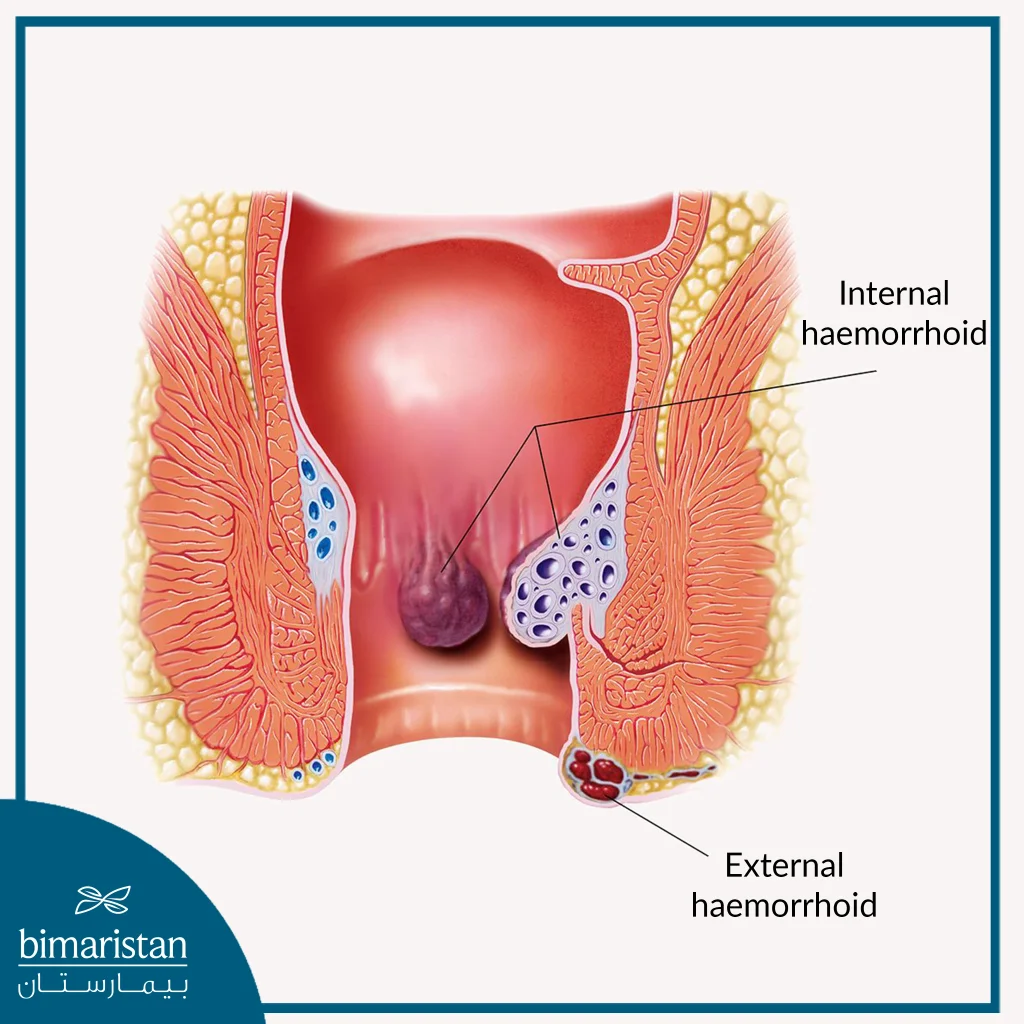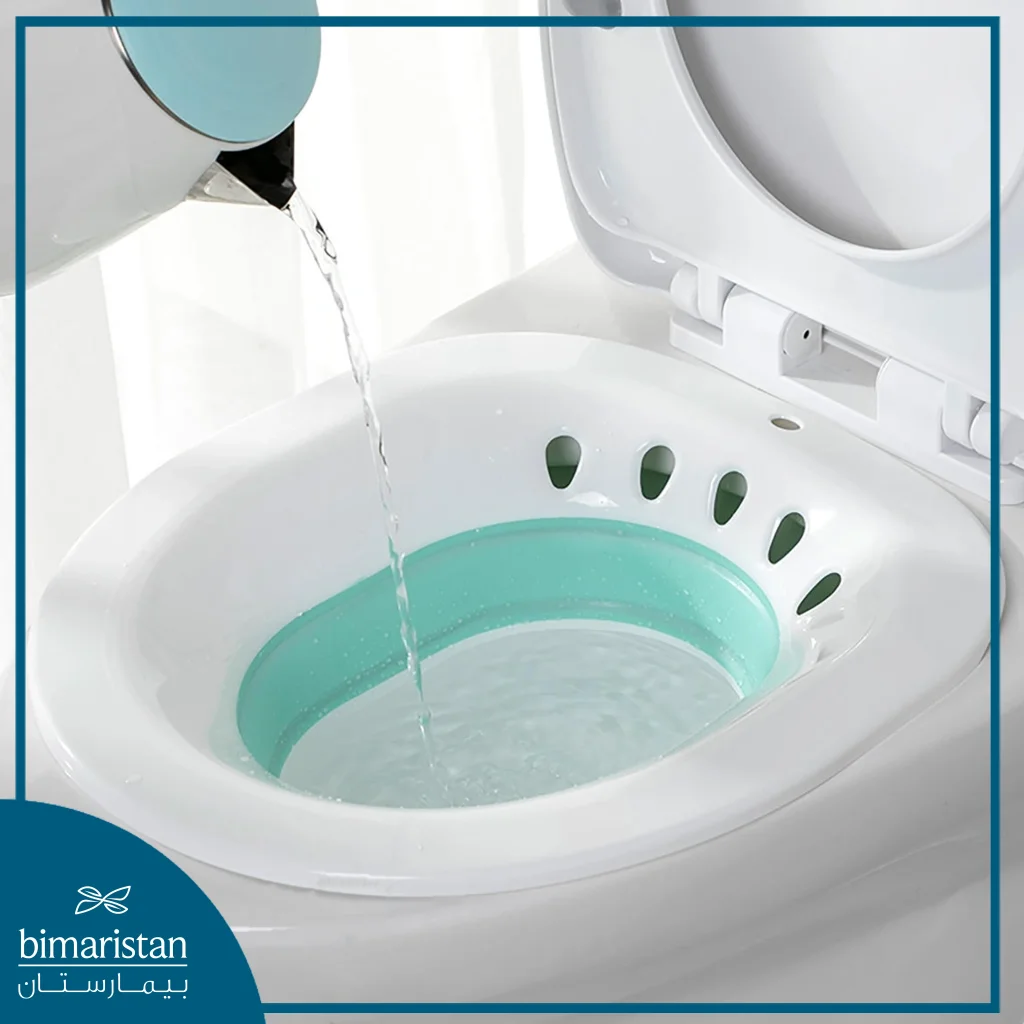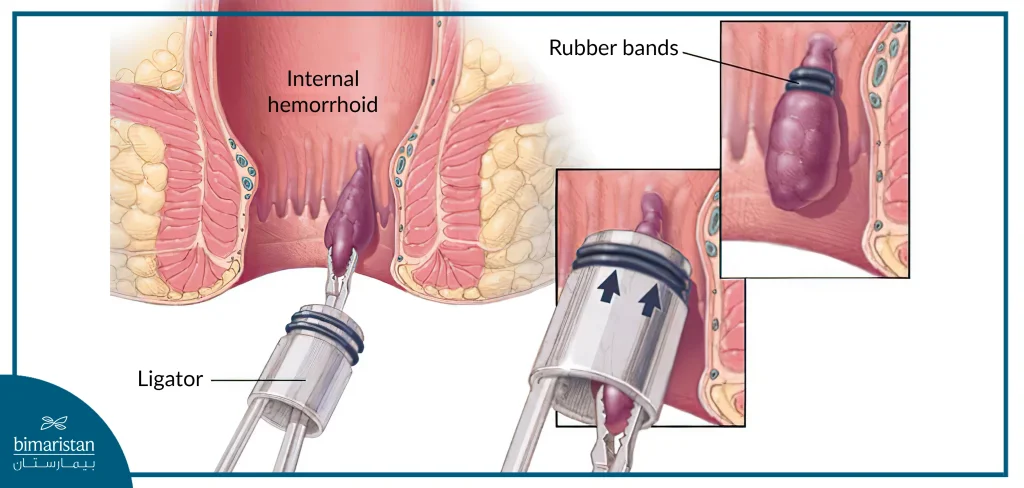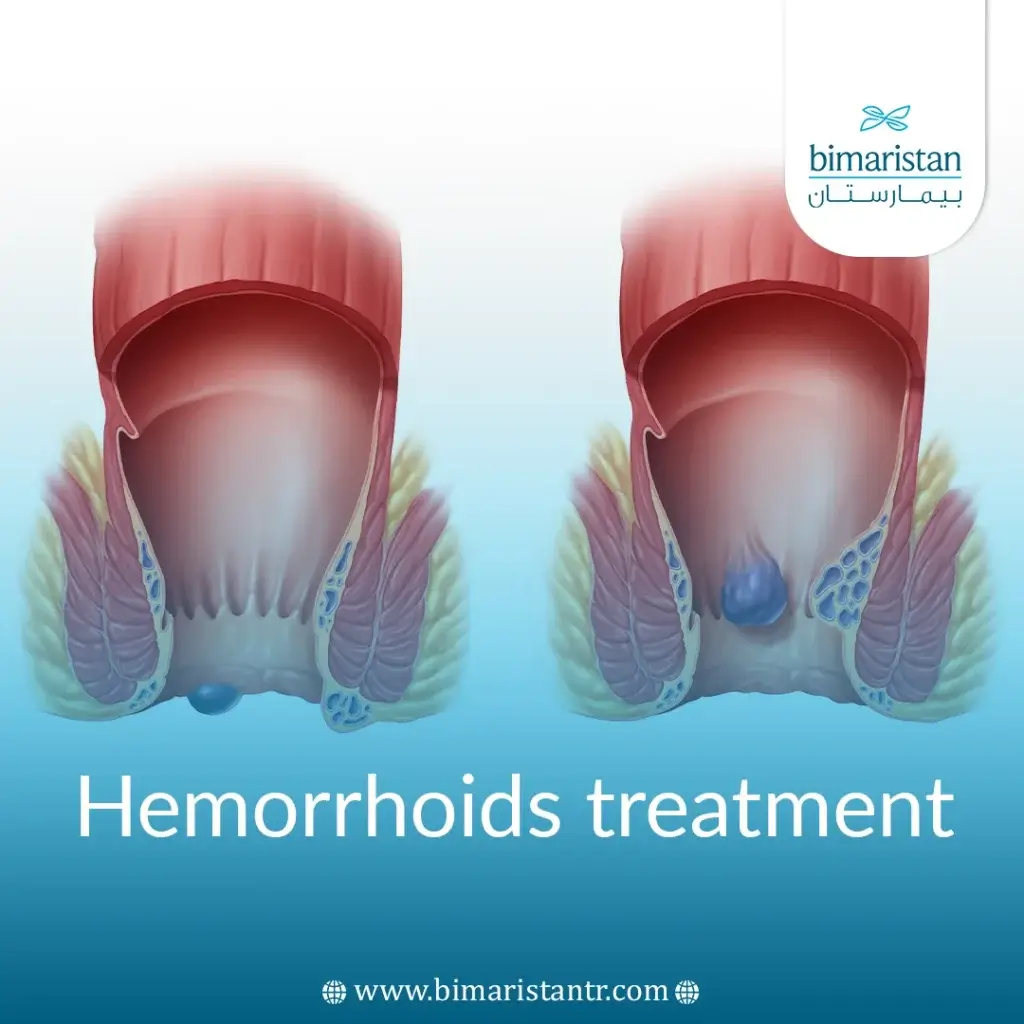Hemorrhoids are one of the most common health problems in Turkey, with approximately 50% of the population suffering from them at least once in their lives. With the development of medical services and treatment techniques in recent years, hemorrhoids treatment in Turkey has become more effective and smoother than before.
This article will explore the most common methods of hemorrhoids treatment in Turkey, from simple home remedies to advanced surgical procedures. We’ll go over the pros and cons of each method, as well as their costs and recovery time. We will also provide tips for preventing hemorrhoids and maintaining colon health. This article will be comprehensive and detailed to help readers in Turkey make the appropriate decision for hemorrhoids treatment.
What are hemorrhoids?
Hemorrhoids are venous dilatations located around the anus and the lower part of the rectum, so they are sometimes called “rectal and anal varicose veins.” As the walls of these blood vessels continue to expand, they become thin and quickly irritated (especially when defecating).
Types of hemorrhoids
Hemorrhoids are divided into two categories depending on where the dilated veins are located:
- Internal hemorrhoids: They form inside the rectum up to the anal rim. This type of hemorrhoid can bleed but is usually painless.
- External hemorrhoids: They form near the anus and are covered by sensitive skin. They are usually painless unless a blood clot forms inside them or expands greatly, and they may bleed sometimes.

Classification of internal hemorrhoids
Internal hemorrhoids are classified according to their size into four grades:
| Description | Category |
| The hemorrhoid remains in the rectum and does not prolapse during defecation | First degree |
| The hemorrhoid prolapses from the anus during defecation and then returns using the finger. | Second degree |
| The hemorrhoid remains prolapsed all the time and cannot be removed manually. | Third degree |
| The hemorrhoid remains in the rectum and does not prolapse during defecation. | Fourth degree |
Causes of hemorrhoids and risk factors
The problem of hemorrhoids is very common and can affect all ages, races, and ethnicities. Its incidence increases with age, as symptoms of hemorrhoids occur in about 50% of people over the age of fifty.
Hemorrhoids can appear in teenagers, but they are rare in children because they take time to form. Factors that increase the risk of hemorrhoids include:
- Having a family history (a family member suffering from hemorrhoids)
- Low-fiber diet
- Abnormal sexual relations
Since the blood in the lower part of the rectum flows upward, any factor that raises the pressure in this area may cause blood stasis and lead to the expansion of the veins. Among the factors that raise the pressure in the lower part of the rectum are:
- Grinding forcefully during defecation
- Chronic constipation or chronic diarrhea
- Sitting on the toilet for a long time
- Frequently carrying heavy objects
- Obesity and weight gain
- pregnancy: As the growing uterus puts pressure on the veins
Hemorrhoids symptoms
Symptoms and signs of hemorrhoids vary depending on their type:
Internal hemorrhoids
Internal hemorrhoids are located inside the rectum, so the patient cannot see and detect them easily. They usually do not cause any pain and cannot be felt due to the lack of sensory nerve endings in the area.
Internal hemorrhoids can be detected by seeing red blood in the stool or on the toilet paper after defecation, as hemorrhoids are considered one of the most common causes of rectal bleeding.
Tissues from inside the rectum can also prolapse outside the anus (protruding or prolapsed hemorrhoids), and this causes pain and irritation when defecating.
External hemorrhoids
External hemorrhoids are located around the anus from the outside, so they are easier to detect than internal hemorrhoids. Because they are covered with skin rich in sensory endings, they are characterized by clear symptoms such as:
- Itching and irritation in the anal area
- A hard, painful lump near the anus
- Anal pain (especially when sitting)
- Bleeding (less common than internal hemorrhoids)
When should you visit a doctor?
Hemorrhoids are rarely serious, but you should visit a doctor when symptoms do not improve after a full week of home treatment and when you see blood in the stool. Gastrointestinal bleeding must be evaluated, whatever the cause is, so that the condition does not worsen and cause serious problems.
Complications that require hemorrhoids treatment
Complications of hemorrhoids are rare, but it must be ensured that they are not present in any hemorrhoid patient. These complications include:
Anemia: Chronic blood loss due to recurrent rectal bleeding from a hemorrhoid may cause anemia in the patient.
Sepsis: Some external hemorrhoids ulcerate and become infected.
Thrombosed hemorrhoid; This happens in an external hemorrhoid when blood clots form in it, and this often results in severe pain, swelling, inflammation, itching, and the appearance of a hard mass near the anus.
Skin loops: They occur when blood clots in a thrombosed hemorrhoid dissolve, leaving skin folds susceptible to irritation.
Strangulated hemorrhoid: This occurs when the anal muscles press on the prolapsed hemorrhoid, cutting off blood flow in the hemorrhoid and causing severe pain for the patient.
Diagnosis of hemorrhoids in Turkey
The doctor may be able to diagnose external hemorrhoids simply by contemplating (especially when blood clots form in the hemorrhoid), but the diagnosis of hemorrhoids depends mainly on the clinical history and clinical examination, and this includes examining the anal canal and rectum by:
- Anal palpation: The examiner inserts the index finger into the rectum after wearing gloves and using a lubricant to palpate the anal canal and rectum and look for any scar, mass, or venous ectasia.
- Visual examination: Internal hemorrhoids may be too soft to be felt during anal palpation, so we resort to endoscopic techniques to detect internal hemorrhoids using special instruments such as anoscope, proctoscope, or sigmoid colonoscopy.
The doctor may also examine the entire colon via colonoscopy to detect colorectal cancer, depending on the patient’s symptoms and risk factors.
The difference between hemorrhoids and anal fissures
Hemorrhoids and anal fissures have similar symptoms, including itching, pain, and bleeding, but they differ in the mechanism of formation. While a hemorrhoid results from dilated veins near the anal opening, an anal fissure results from a tear in the anal rim.
The doctor can easily distinguish between the two conditions through a visual examination or special tools. Bimaristan Medical Center will guide you to the best centers that provide the optimal treatment for your condition.
Methods of hemorrhoids treatment in Turkey
There are many methods available that can treat the problem of hemorrhoids and remove them permanently, some of which can be carried out at home and some of which require going to a specialized medical clinic. The following are methods of hemorrhoids treatment, including internal and external hemorrhoids:
Hemorrhoids treatment at home
Hemorrhoids can improve on their own without surgery. You can start using some over-the-counter medications and make lifestyle changes.
Here are some tips that may help you relieve pain and irritation at home:
- Make sure to eat fiber-rich foods, such as fruits, vegetables, and grains of all kinds. This will increase the volume and softness of the stool, so you do not need to strain hard when defecating. Thus, fiber reduces the pressure on the hemorrhoids and avoids dilatation, bleeding, or inflammation of the hemorrhoids. Studies have proven the benefit of fiber in improving symptoms. But gradually introduce fiber into your diet to avoid flatulence and digestive gas.
- Drink more water daily to avoid hard stools and aid recovery.
- Immerse the hemorrhoid area with warm water by sitting in a sitz bath for 10-20 minutes after each bowel movement or two or three times a day. This will help you relieve anal sphincter spasms, itching, and irritation (it is not necessary to buy special bathtubs; you can sit in a regular bathtub Or bathtubs immersed in warm water to a depth of 3 inches (equivalent to approximately 8 cm).

- Try applying cold compresses or ice cubes to the hemorrhoid area and applying pressure for several minutes. Cold compression may help relieve swelling of anal hemorrhoids.
- Use over-the-counter topical preparations on irritated hemorrhoids, such as fats or ointments containing lidocaine hydrocortisone or witch hazel pads. These are natural anti-inflammatories that reduce swelling and itching.
- You can take any of the oral pain relievers, such as paracetamol, ibuprofen, or aspirin, to relieve the symptoms of anal hemorrhoids.
Resection of thrombosed external hemorrhoids
It is a procedure intended external hemorrhoids treatment, as if a clot forms in the external hemorrhoid, the doctor will remove it by making an incision to drain the clot under local anesthesia, which will give you quick relief, preferably within 72 hours of the blood clot forming.
Methods of hemorrhoids treatment without surgery in Turkey
It is used when the hemorrhoid continues to bleed or causes pain to the patient. These treatments are performed in the doctor’s office and do not usually require anesthesia:
Rubber band ligation
It is the most widely used procedure in hemorrhoids treatment in Turkey, as the doctor places one or two bands around the base of the internal hemorrhoid using a special tool to cut off the blood supply to it, which leads to the hemorrhoid dying, shrinking, and falling off spontaneously within a week.
Rare complications of this procedure include moderate pain, infection, and bleeding that may begin after 2-4 days and is rarely severe.

Sclerotherapy
Also called injection for hemorrhoids treatment, it is used only for non-protruding internal hemorrhoids treatment by injecting a chemical solution into the dilated vein, which causes the hemorrhoid to shrink. This method does not cause significant pain but is less effective than ligation with a rubber band.
Coagulation (laser hemorrhoids treatment)
This technique uses a laser, infrared rays, or heat to coagulate small bleeding internal hemorrhoids and make them shrink and harden.
Surgical hemorrhoids treatment in Turkey
If home measures are not sufficient for hemorrhoids treatment or if the hemorrhoids are large, the doctor will resort to surgical hemorrhoids treatment through one of the following methods:
Hemorrhoidectomy
The doctor surgically removes hemorrhoids in cases of protruding hemorrhoids, external hemorrhoids that cause persistent symptoms, or internal hemorrhoids that reappear after being tied with a rubber band.
This procedure is performed under local, lumbar, or general anesthesia and is considered the final and most effective hemorrhoids treatment for stubborn. The pain after the operation is described as tolerable and can be relieved with oral painkillers.
Patients may go home on the same day of surgery or the next day, but recovery and return to work may take 7-10 days.
Hemorrhoid stapling
This technique is considered a less painful alternative to hemorrhoidectomy and allows the patient to return to his daily life more quickly. It is called “stapled hemorrhoidopexy.”
This method is used for bleeding or prolapsed internal hemorrhoids treatment. It is performed under general or local anesthesia using a bead instrument that cuts off the blood supply to the hemorrhoid and fixes it in its natural place.
One of the disadvantages of this operation is that it is associated with a high rate of recurrence, as studies have indicated that the traditional hemorrhoidectomy is superior to the process of pinning hemorrhoids with beads in preventing recurrence.
Prevention of hemorrhoids
You can avoid hemorrhoids as you age by following the following tips:
- Do not hold in stool for long; go to the toilet immediately when defecating.
- Do not sit on the toilet for long periods, and do not strain hard when defecating.
- Eat foods rich in fiber and drink adequate amounts of water daily.
- Maintain your physical and physical activity because this helps with bowel movement.
It is recommended not to use laxatives or enemas that stimulate bowel movements without medical advice.
If you have any questions about hemorrhoids treatment in Turkey, Do not hesitate to contact us at the Bimaristan Family Center in Turkey

